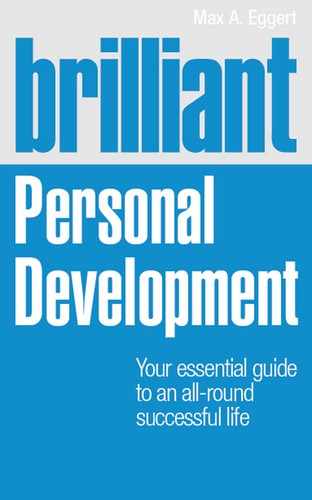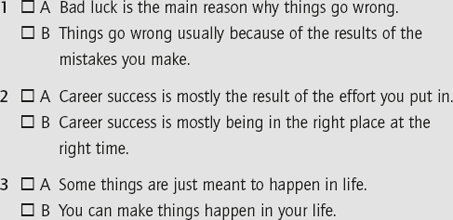
We are starting off as we mean to go on with an activity which will help you get the most out of this chapter. It’s a questionnaire and I need you to be true to yourself here, despite the fact that some of the questions may tempt you to respond in a way that will make you appear to be more socially acceptable. Resist the temptation, and answer the questions as truthfully as possible, otherwise you will have what psychologists call a FIFO – fantasy in, fantasy out.
A questionnaire
For each pair of statements, tick the one that you feel/think/ believe is more you. There are no right or wrong answers and your first response is your best response.
Please answer each pair in its own right; just because you answered a particular question in a certain way should not influence your response to any other question. Please answer all the questions.
Scoring:
Give yourself 1 point if you scored the following:
1B, 2A, 3B, 4A, 5B, 6A, 7A, 8B, 9A, 10B
If you scored 6 and above you have a tendency to be a HLC.
If you scored 4 and below you have a tendency to be a LLC.
Let’s explain this. The questions being asked in the questionnaire elicit whether or not you feel/think/believe that you are in charge of your life – high locus of control (HLC) and can do something about it – or that your life is essentially outside your control so you have a low locus of control (LLC).
This aspect was being investigated by Julian Rutter way back in 1954 who, as a typical psychologist, divided people up into two groups:
- Those who believed that they were able to shape their lives were thought to have a high internal locus of control (HLC).
- Those who believed that they were unable to shape their lives were thought to have a low internal locus of control (LLC).
Our locus of control helps us to decide which forces account for our failures and our successes. Being high or low on our locus of control obviously has a direct and significant effect on whether we take risks or not, how motivated we are to attempt to do things for ourselves, our expectations in life and even our self-esteem.
If you have a low locus of control then this text, and especially the activities, are going to be hard work for you because self-help is based on the principle that one can change the status quo, develop and/or grow with personal effort plus the investment of time.
Remember the mantra at the beginning of the book ...
‘If it’s going to be, then it’s down to me.’
It’s difficult to live this mantra if one believes that everything is down to luck, destiny, your genes or your family background, education, or your current social environment – all factors outside your control.
Obviously, there is such a thing as good fortune, inheriting a better gene pool, growing up in a loving and supportive family and having influential friends. But good fortune doesn’t account for all of your success. It simply provides a better starting point. What you do with your serendipity of life’s advantages is up to you.
 | ‘Practice does not make perfect results; it is only perfect practice that achieves perfect results.’ Anon |
A challenge
Changing your behaviour is one of the most difficult tasks you can set yourself. Just think, you have been behaving this way for most of your life and now you want to be different!
We are all creatures of habit. It’s a very efficient way of living. Our brain takes in new information, we practise using it and turn it into a new habit. You can see this in many areas of your everyday life.
Just think about that first driving lesson. It all seemed so complex and frightening. How would you remember all the things you needed to do at the same time? Engine on, parking brake off, clutch in, check mirrors, signal, reach the bite, drive off. And yet now you will do all of this whilst thinking about what you are having for dinner, what is happening on the news, or even what is happening on the back seat if your children are bickering. There are many other occasions in our lives when we behave and respond to situations as if we are on automatic, even on cruise control, without even realising it.
In his 1989 study, self-help guru Dr Maxwell Maltz found that to really embed new learning we have to turn it into a habit, which means practising the new behaviours for 21 consecutive days. During those days you may find this little verse helpful:
‘Watch your thoughts, for they become words.
Watch your words, for they become actions.
Watch your actions, for they become habits.
Watch your habits, for they become character.
Watch your character, for it becomes your destiny.’
Ralph Waldo Emerson, essayist and leader of the Trancendentalist movement
Suggestions for success
Here are some suggestions to help you through and assist you in developing the skills that are important to you.
Suggestion 1
Attempt only one thing at a time. Rome certainly wasn’t built in a day and nor will you be able to develop yourself in lots of ways all at once.
Suggestion 2
Be continuously conscious of your behaviour and reflect on it regularly, preferably daily, paying particular attention to when you are doing well and when things are not going so well.
Suggestion 3
Go for easy wins first. If you try something hard first and fail then you are likely to give up with the rest of your agenda. Be gentle with yourself and get some easy runs on the board. This will give you the confidence necessary to keep you motivated. Once you have the confidence then change tack and apply ‘Grandma’s law’ (see Chapter 1).
Suggestion 4
Set yourself reasonable and sensible targets. Occasionally we allow our enthusiasm to outrun us: make 20 new network friends this month; date five people in a month; volunteer to make two presentations at the board meeting this month; get to my ideal body weight within a month. Unrealistic targets bring realistic failures. In reality, your zeal has zapped you.
 | ‘You don’t need to see the whole staircase but just take the first step.’ Martin Luther King, civil rights leader |
Suggestion 5
Allow for and anticipate some slippage, especially when you are under pressure or in new situations. We revert to what we instinctively know because that is when we are most comfortable. Many Britons have died in car accidents in France because intuitively, in a sudden, dangerous situation, the driver has automatically responded by driving on the left-hand side of the road. Thankfully your slippage won’t be as dramatic, but do expect some occasional slippage back into your old ways. Treat your slippage as a learning opportunity. Don’t beat yourself up; it’s only a temporary setback.
 | ‘They who struggle and yet fail today, can live to fight another day.’ Erasmus, 1542 |
Babies, when learning to walk, in an attempt to get somewhere quickly will often deliberately revert to crawling because it’s easier, faster, more effective and they know they can do it. However, babies never, never give up in their attempts to walk.
When you realise your lapse in motivation, commitment and behaviour then consider it as a ‘rest day’ and get back on track tomorrow. Jugglers, especially when they are learning or developing a new trick, have a great saying: ‘If you ain’t dropping you ain’t juggling.’ Slippage goes with the territory of self-development so, ‘If you ain’t slipping you ain’t developing’!
Trite but right: even two steps forward and one step back still makes one ahead of where you were.

Take slippage as a sign of progress and let it motivate you to get back on track.
Suggestion 6
Be satisfied with small wins. Massive changes in a person’s behaviour can be achieved, but they are usually associated with actual or anticipated trauma. Sometimes a major change can occur after a significant emotional event, but then again it requires an external agency. Be satisfied with small wins because most of us are not lucky enough to win the lottery.
Suggestion 7
Reward yourself when you achieve a specific target. Alright, I know that humans are far superior to laboratory rats, pigeons and monkeys but reward for achievement definitely works for them and it will definitely work for you. Rewards work best when they are specific to you. If you like wine then a six pack of beers is not going to cut it.
Rewards should be graded as well, for example (providing they work for you) ice-cream for a small success, a bottle of wine to enjoy with your partner for the next, then a meal out, then a weekend break and for the big one a two-week cruise or some time on the Orient Express. As you enjoy your reward at the beginning, middle and end tell yourself, ‘I am doing this because I have just achieved ... and I deserve it.’
Suggestion 8
Work with a friend who wants to achieve the same things as you; essentially we are pack animals, enjoying the company of people like ourselves. It is true, as four young men sung half a century ago, that: ‘You get by with a little help from your friends.’1
Suggestion 9
Keep a written list of all your successes, then from time to time, especially when things get difficult, read through what you have achieved, reflect on your successes, rejoice and feel proud. Achievements are energising, particularly in those inevitable ‘down’ moments. Achievements are yours: you achieved them and no one can take them away from you.
List all the things that you can do now which you could not do three years ago. You will be amazed at how your talents and abilities have grown. If you have difficulty doing this you were very wise to buy this text!
Suggestion 10
Well not quite a suggestion but a possible challenge. As you change you will find that others will be surprised at the ‘new you’. Some will prefer the ‘old’ you and social pressure, even from close friends, may be brought to bear to keep you the way you were.
When we were teenagers we all went through that cloning stage of strident individuality paradoxically resulting in us all looking, dressing and speaking alike. We adjust when we discover the real face of maturity behind all the teenage acne. Good friends will support you as you grow and develop. However, it’s a very common phenomenon that most people you know will wish for you to be successful but not more successful than they are!

- Attempt only one thing at a time.
- Review your behaviour regularly.
- Do the easy things first.
- Keep your goals reasonable.
- Anticipate occasional slippage.
- Be satisfied with small changes.
- Reward yourself.
- Work with a friend.
- List and review your achievements.
- Realise that friends might not always support you.
1 ‘With a Little Help from My Friends’ is a song written by John Lennon and Paul McCartney, released on the Beatles’ album Sgt. Pepper’s Lonely Hearts Club Band’ in 1967.


